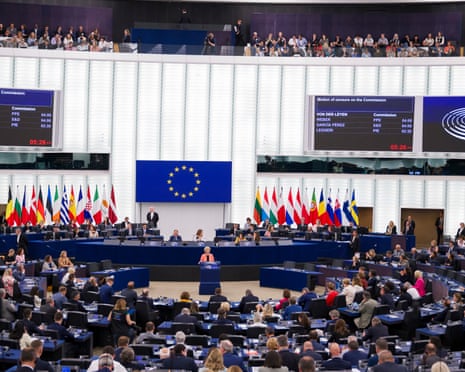US agrees to send ‘defensive’ military aid to Ukraine – Europe live
As we wait for more reactions from Ukraine, let’s start with a brief catch up on last night’s European parliament debate on Ursula von der Leyen and her leadership of the European Commission.
Nearly one year ago von der Leyen was returned as European Commission president by the European parliament with a bigger majority than the first time around in 2019. The same forces that propelled her back to office with a comfortable level of support in 2024 are now keeping her safely in post.

Speaking to MEPs on Monday, von der Leyen dismissed as “debunked conspiracy theories” the central claims of a motion of censure designed to unseat her, framing the political move from a right-wing nationalist MEP as part of “an age of struggle between democracy and illiberalism”.
The European parliament will vote on Thursday on a motion tabled by Romanian nationalist anti-vaxxer MEP Gheorghe Piperea, ostensibly over von der Leyen’s refusal to release text messages linked to the negotiation of vaccine contracts during the pandemic. In theory, the vote could trigger the downfall of von der Leyen and her commissioners.
But even its author does not expect it to get the required majority.
Addressing MEPS in Strasbourg on Monday, von der Leyen derided Piperea’s world of conspiracies and alleged sinister plots by “what he calls Brussels”, going on to point to wider threats to democracy from extremist parties,
“There is no proof that they have any answers, but there is ample proof that many are supported by our enemies and by their puppet masters in Russia or elsewhere.”
Unsurprisingly she was strongly supported by her own European People’s Party group. Equally expected, were the unenthusiastic declarations of support from the socialists, centrists and greens, who voted for her in 2019, and will vote against the upcoming motion of censure. They have grievances, but none want to hand a gift to the anti-EU far-right, by bringing down the commission at such a turbulent moment for international politics.
Iratxe García Pérez, leader of the Socialist group, criticised the EPP over the occasions it had voted with the far right, as well as the centre-right group’s stance on the EU’s 2040 climate targets and opposition to an EU ethics body. She accused von der Leyen of looking the other way on these issues.
Valérie Heyer, a French member of the centrist Renew group, chided von der Leyen for the same reasons, concluding: “Don’t take anything for granted. Please put your own political house in order.”
While the far-right – Hungarian prime minister Viktor Orbán’s Patriots for Europe and the more extreme Europe of Sovereign Nations – will vote for the motion, the other right-wing group, the European Conservatives and Reformists, is split.
Piperea, an ECR member, was responsible for the motion, but the group is dominated by the party of the Italian prime minister Giorgia Meloni, who has no wish to bring down the more right-leaning commission - which includes a vice presidency post for her ally, Raffaele Fitto. They will have a free vote, where two-thirds of their 79 MEPs are expected to vote against the motion.
For her part, von der Leyen offered a modest olive branch to her supporters, saying she was always ready to work for compromise. Listing EU-US trade talks, Ukraine, China, she dropped a not very subtle hint at the stakes: “Europe must show strength… This strength only comes through unity.”